Peter MALONE
Saturday, 18 September 2021 19:51
Wild, The/ 2006
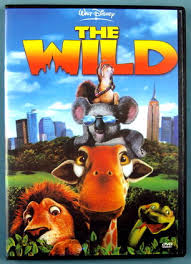
THE WILD
US, 2006, 94 minutes, Colour.
Voices of: Kiefer Sutherland, James Belushi, Eddie Vizard, Janine Garofalo, Richard Kind, William Shatner, Greg Cipes.
Directed by Steve ‘Spaz’ Williams.
In 2005 with Madagascar, we had a group of animals in a New York Zoo (with comic voices by prominent stars) who were discontent with having to perform for humans and who yearned for getting away to the wild.
In 2006, we have a group of animals in a New York Zoo (with comic voices by prominent stars) who are discontent with having to perform for humans and who yearn for getting away to the wild.
In 2006, this was partially funny, partially too hip for a genial comedy adventure. In 2005, this is partially funny but not quite so hip.
Ryan, a meek young cub, listens to stories of bravado and adventure in the wild from his Lion King father – who in fact is just throwing him a line. Poor Ryan can’t roar, is mocked and bullied – and runs away. The container has him bound for Africa and the wild. Dad (voice: Keifer Sutherland), squirrel Benny (James Belushi) and his girlfriend, giraffe Bridget (Janeane Garofolo) and very British (of all things) koala (Eddie Izzard) go in pursuit and finish up in the wild doing great deeds of derring-do and rescuing Ryan.
A bit take-it-or-leave-it.
1. The popularity of animation films in the first decade of the 21st century?
2. The popularity of animal stories, in the tradition of Madagascar? And lost children seeking their father of the father seeking them, as in finding Nemo? Finding Nemo?
3. The style of the animation, the drawing of the animals, the backgrounds, New York and the zoo, African locations? The action sequences?
4. The voice cast, the humour of the screenplay, eccentric characters, interactions? Musical score?
5. The setting in the zoo, Ryan as a young lion, listening to his father’s stories, over and over again? His relationship with the other animals? The liking
him, wanting to find him when he was taken?
6. Ryan, taken, going to Africa, in the wild?
7. Samson, wanting to find his son, getting help from his friends, Benny with his squirrel style, Nigel and the oddball koala, Richard, Larry, the flamingo? Nigel taking over the conversations and his incessant patter, comic character?
8. Going to Africa, a different land and landscape, the action, the adventures, the dangers?
9. Kazaar, the villain, voice and style? Confronting Samson and the others? With Ryan?
10. The different tone of the film in Africa, the encounters with the animals, the talking crocodiles? The attempts at the rescue?
11. The volcano, eruption, dangers, compounding the difficulties?
12. All is well with a happy ending, families reunited, going home?
Published in Movie Reviews
Published in
Movie Reviews
Tagged under
Saturday, 18 September 2021 19:51
Secuestro Express
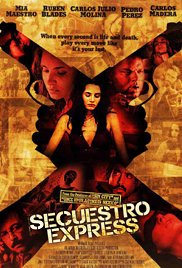
SECUESTRO EXPRESS
Venezuela, 2004, 80 minutes, Colour.
Mia Maestro, Jean- Paul Leroux, Ruben Blades, Carlos Julio Molina, Pedro Peres.
Directed by Jonathan Jakubowicz.
Already the most popular Venezuelan film at the country’s box-office – and criticised by the government for giving a wrong impression of Venezuelan society and Caracas – this is a film which is on the move. Shot with a digital camera, giving the director almost limitless fluidity, and edited with jump cuts which increase the pace, this is a grimly exciting picture of the rapidly increasing feature of some Latin American countries, abductions. (For some American versions of this theme in recent years, try Proof of Life and Man on Fire.)
The action (only 80 minutes) takes place over a few hours. A gang who resent the wealthy middle class go out on an early morning reconnaissance to choose a victim. They pick the couple that the audience has been watching. He a playboy with a taste for cocaine, she a volunteer at a child centre (and not against the drugs either). The abduction is comparatively easy and phone calls are made to parents with demands that are not too outlandish. (A complication does occur when the man goes to retrieve some cash and someone tries to rob him. A gun solves the problem.)
The abductors are on edge and are prepared to mistreat and abuse their prisoners. There are some further complications, especially in the behaviour of the man, which we do not expect. The girl (Mia Maestro) survives the day but is put in final danger after being found by police who seem almost as corrupt as the abductors.
Ruben Blades and Mia Maestro are the only professional actors. The non—professional cast worked in rehearsal for six months to achieve the level needed for this film.
The behaviour is ugly and would put fear into any potential visitors to Caracas. Nobody is really good, so this is a grim picture of a current phenomenon made with great visual flair and pace.
1. A significant film for the Venezuelan film industry?
2. A brief film, over a 24 hour period, hand-held camera and a sense of immediacy? Audiences interested in the crime, identifying with the people abducted?
3. The title, abduction express? The prevalence of abductions in Latin America at this time? A cautionary story? Audiences wary about a visit to Caracas?
4. The basic plot: the couple, the criminals, the capture, the violent treatment, contact with the father for ransom, the behaviour of the criminals, the effect on the couple, going to the bank, the attempted robbery, the use of the gun? The father, the contact with the money, the release of the daughter? The arrival of the police, their violence, would-be rapists?
5. The plausibility of the plot, the establishing of the character of the couple, his wealth, drug use, her social work, also the use of drugs? In the vehicle, outside the club? The characters who did the abduction, their social background, poor class, criminal class, motivations, use of violence?
6. The gap between the wealthy and the poor, social advantage or disadvantage, this underlying theme?
7. The character of the couple, the attention given to each of them, before the abduction, their relaxation, together, the experience of the violence, the treatment, the uncertainties, over 24 hours?
8. The character of the criminals, the leader, each and his use of violence, threats, watching, slapping faces? The visit to the bank and the attempted robbery? The violent criminal and the possibility of rape? The leader and his controlling him? The dealings with the father? The release?
9. The details of the time of abduction, step-by-step, almost documentary-like?
10. The finale with the police, the credibility of this development, the critical comment on the role of the police and their behaviour?
11. A taut thriller, on a topical subject?
Published in Movie Reviews
Published in
Movie Reviews
Tagged under
Saturday, 18 September 2021 19:51
Imagine Me and You
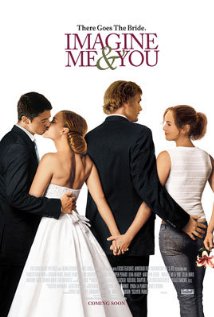
IMAGINE ME AND YOU
UK, 2006, 94 minutes, Colour.
Piper Perabo, Lena Headey, Matthew Goode, Darren Boyd, Anthony Head, Celia Imrie.
Directed by Ol Parker.
Another wander around the Notting Hill, Love, Actually neighbourhoods of London. There are amiable characters, oddball characters, downright eccentrics, characters unwillingly caught in the rat race and characters who have sexual problems (actually, that is most of them except for a sensible, maybe over-precocious young girl). Some of them have sexual identity problems, one in particular. This is Rachel who glances at the woman who has prepared the flowers for her wedding and is, although at first she does not realise it, smitten. What happens?
Should it all be live and let live? Should it be follow your heart? But what about the abandoned partner or spouse? Does the older generation offer example and security? Are there any moral issues.
Piper Perabo is the bewildered bride (coming at this issue rather late in life one might have thought). Lena Headey is the charming florist. Matthew Goode is the (too?) kindly husband. The option is follow your heart, but this is all set in a kind of fairytale world where a Graduate-like ending, with each woman standing on top of a taxi in a traffic jam in the City of London, does not fully answer the questions which need to be asked.
1. A romantic comedy – with quite a difference?
2. The British tone of the film, the London locations, familiar with Notting Hill from previous films? The touch of the upper-class, the wealthy, the characters from this kind of film rather than gritty realism? The musical score? Songs?
3. The title, its tone, as applied to Rachel, to Luce, and inviting the audience to empathise with these characters?
4. The wedding, Rachel and her happiness, Heck and his charm? Rachel seeing Luce, the flower arrangement, the interest and attraction? The ceremony, the celebration?
5. Rachel and Heck, the background of their families, joining in the celebrations, the “Hugh Grant” type? The strong-minded mother and her remarks?
6. Rachel’s story: background, love for Heck, the family, the engagement, the wedding, a love for her husband, life after the wedding, the invitation to Luce to come, a realisation that something was different, the nature of woman-to-woman love, Luce and her response? Heck and his response?
7. Luce, her personality, her work with the flowers, at the wedding, the attraction to Rachel? The visit to the meal, discussions with Rachel and Heck?
8. Heck and his questions, her explanation of her emotions, her orientation? Trying to understand, accept?
9. The contrast with the realistic presentation of the emotional issues, sexual behaviour, sexual orientation and the touches of fantasy, especially the end, the characters in the taxis, the song?
10. The audience being invited to identify with all the characters, their experiences, seriously, with the light touch? And a challenge to the audience’s perceptions of same-sex orientations, love and behaviour?
Published in Movie Reviews
Published in
Movie Reviews
Tagged under
Saturday, 18 September 2021 19:51
Scanner Darkly, A
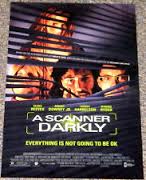
A SCANNER DARKLY
US, 2006, 100 minutes, Colour.
Keanu Reeves, Robert Downey Jr, Woody Harrelson, Winona Ryder.
Directed by Richard Linklater
The ambiguous hero of this version of the novel by Philip K. Dick, ruminates on the scanners that abound in the future society and prefers that they see clearly, really see the real person, than scan darkly. He is absolutely right but mainstream audiences may well feel that the film is sometimes too obscure and unclear, too much dramatised darkly.
This is what they call a cult film. It means that it appeals to a niche audience, the readers of Philip K. Dick’s novels and short stories and the fans of the films based on them. There are quite a few. Blade Runner is the best known and appreciated. But, there are also Total Recall, Impostor, Minority Report and Paycheck. Dick has attracted top directors, Ridley Scott, Paul Verhoeven, Steven Spielberg, John Woo.
This time it is cult director, Richard Linklater, who came to prominence with his ‘slacker’ comedies, Dazed and Confused and SubUrbia?. He is a director who likes words, lots of reflective conversations and philosophical reflections about life (Before Sunrise, Before Sunset, Tape). This is especially true of his 2001 film, Waking Life. But, what was distinctive about Waking Life was that computer animation was superimposed, painting on the live action by a process called interpolating-rotoscoping.
Rotoscoping returns with A Scanner Darkly. It suits the Dick storytelling, a surreal surface overlaying reality. (In fact, in the story, the central character wears a special suit for surveillance that is continually changing features, gender and clothing, very effectively achieved through animation.) This makes the film look like a cinematic graphic novel.
Dick died aged 54 through drug complications. This plot is about drugs, a particularly mind altering and destroying drug. A special agent (Keanu Reeves) is commissioned to investigate, survey his friends and a dealer and report. However, he is an experiment, set up by government to track the drug and the institution which produces and is alleged to cure addiction. It destroys his brain and he cannot tell whether he is himself or the agent he creates. Reeves has a solid track record, Johnny Mnemonic, Matrix, Constantine, for portraying this kind of character with confused and lost identity.
Robert Downey Jr does another of his clever logorrhoea-like performances as do Woody Harrelson and Rory Cochrane. Winona Ryder is ultimately even more ambiguous as dealer, agent, controller.
Needless to say, technically with the rotoscoping animation, the use of lighting and colour, the clarity and blurring of the actors, the film is a cinematic tour-de-force. But, whether it excites interest beyond those in the know, is quite another question.
1. The popularity of novels by Philip K. Dick? His own life experiences, writings, based on his life, drugs, death?
2. Dick and his interest in science fiction, futuristic stories? The various film versions of his stories?
3. The work of the director, his career?
4. Rotoscoping animation, the live action sequences, the animation on this basis, the voices, the compositions, the locations – more real than the characters? The effect of the animation for the audience? In appreciating the characters, real and hallucinatory? Bob wearing the suit and its continuing surface changes? States of consciousness? Musical score?
5. The introduction to Charlie Freck, in his home, his appearance, getting up, the drugs, his mental state, the insects, his delirium, his addiction? His interpretation of his friends? Going to Bob’s house, communicating, wanting more drugs – and his deterioration throughout the film?
6. Substance D, authorities wanting to control it, the number of addicts, the police and their work, the pushers, the cash exchanges, Donna and her relationship with Bob, travelling together in the car, discussions, her deals?
7. Keanu Reeves as Bob, his workers undercover agent, Fred? The introduction to him in the suit, the different voice, the chameleon, shapes and changes on the suit? The real Bob within? The official and the discussions? His task? The official saying he did not know who the real agent was apart from the name Fred? Bob at home, his house, the visit from Charlie Freck, Ernie and his being in the house, Jim Barris? Bob working undercover?
8. Barris and his style, Robert Downey Jr, the deals, incessant talk, off the top of his head, wanting to help the authorities, his critiques, supplying information, information with Fred present, the official? Suspicions? His own undercover work, the weapons, unmasked?
9. Ernie, his character, continually high, his friendship with the group?
10. Bob, in the group, disguised, his discussions at home?
11. Fred/Bob, Substance D, Bob taking more and more drugs, the effect?
12. The visits to the doctors, the interviews, the shapes in the cards, Fred and his lying to the doctors? The second visit, in decline, their handling of the situation?
13. Going to the boss, expressions of disappointment about the drug-taking, new orders?
14. His going to the resort, his mission, to unmask the company and its promotion of Substance D? The various personalities in the institution? His own
states of consciousness within the organisation?
15. Donna, the truth, her working undercover, her concern?
16. The film helping audiences to move into the world of Philip Dick, the realism of life in the American city, drugs and the future, altered states, the need to control? And the effect on different individuals?
Published in Movie Reviews
Published in
Movie Reviews
Tagged under
Saturday, 18 September 2021 19:51
Gamer
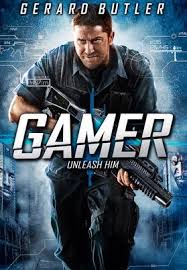
GAMER
US, 2009,
Gerard Butler, Michael C. Hall, Logan Lerman, Amber Valetta, Kyra Sedgwick, Allison Pill. Ludicris.
Directed by Neveldine/ Taylor.
After the hijinks and violence of Crank, then the off-the-wall and over-the-top style of its sequel, Crank High Voltage, fans know what to expect from the writing/directing team who go by their surnames, Neveldine/ Taylor.
However, this one, which shares the delirious visual style of its predecessors, actually has some plot and themes – which may or may not be appreciated by the video game players (addicts) for whom the film was made.
Once again, especially during the credits with footage from the fine nature film, Baraka, the editing has us reeling as it introduces a world, 'not too many years from this exact moment' (sic), and shows us New York hooked on a huge television game where characters are controlled by the players at home. The game is called Slayers and the characters, especially Kable, played with determination by Gerard Butler, are prisoners with life sentences – if they can survive a number of games, they receive a pardon.
Slayers and its previous game show, a sex show called Society, are the brainchildren of a multi-millionaire (acquired more quickly, he says, than Bill Gates) whose aim is mind control and world domination. He is played by TV's Dexter, Michael C. Hall, a man of menace as well as media charm and who breaks out into a song and dance routine of Cole Porter's Under My Skin as he prepares combat with the hero. It is that kind of film.
Kyra Sedgwick is an ambitious TV host who wants a story as the hero escapes from his game and from prison and goes in search of his wife, who is trapped as a controlled performer in Society, and his daughter.
This is a future where the population is hooked on sensationalist reality TV and self-indulgence, where a power-hungry madman has invented cells for replacement of brain matter so that everyone does his will. However, there is a resistance group and even the media host gets a trace of conscience. The message is the usual one, that freedom, obtained by heroic individuals, is what humans really need and want. It's just that along the way, Neveldine/ Taylor exploit, with great visual sensationalism and flair, the uglier and violent side of this futureworld. (Film Buffs have noted the similarity to the plot of the Arnold Schwarzenegger thriller of 1987, The Running Man.)
1. 21st century science fiction, in the world of computer games, reality television, of society’s self-indulgence and apathy?
2. The visuals of the film, production design and values? The cities, the buildings, homes, television, the world of affluence, the world ordinariness – and of computer games players? The visualising of the technical aspects, the games, transmissions, controls? Action sequences, stunts and effects?
3. The basic premise, ordinary citizens being able to control people in the game? Those controlled having to win their battles for freedom? Their brains affected? The megalomaniac businessman and his work on human brains, to control people?
4. The focus on Simon, adolescent, love of games, his involvement, his passion, self-centred, reclusive, his relationship with other people, isolation? In his room, screen his control? His controlling Kable, the battles, the dangers? Gradually becoming more involved in the real story, in the action, the effect on him, for Kable? Participating in the rescue, victory and death of Castle?
5. Ken Castle, his personality, eccentric, his bursting into song and dance, his relationship with other people, control? Brainwork? The games, Slayers, Society? Games of sex and violence? His controlling the games, the prisoners, getting involved in their lives, their quests? The build-up to confrontations, defeat? Players becoming independent?His becoming more cybernetic?
6. Gina Parker Smith, her work as a journalist, Television, investigations? Her personality, ambition? Her ruthlessness? Greater involvement, a change of heart, with Kable? Contributing to change and the defeat?
7. The variety of personalities within the games? Kable, the serious hero, the murder, scapegoat for Castle, in prison, being controlled by Simon, communicating with Simon, the visualising of the many battles that he had to go through to win? The game becoming more of real life? Rescuning his wife? Victory?
8. The characters in the games, energy? The presentations of violence? Brutality? The visualising of sexuality – and exploitation?
9. The Humanz, a rebel group, secrecy, the personalities, their leadership, motivation, Castle and his pursuit, the attack and deaths? The leadership and collaboration in Castle’s downfall?
10. Trace, her character, involvement in the action?
11. The film seen as a giant videogame of the big screen, the characters, the action, dangers, control and being controlled?
12. The film seen as a futuristic parable, the surrender of mind and imagination to authorities and their powers? Exploitation? The challenge to move out and to move into reality?
13. The film as heightened, very heightened, reality? The presentation of the games and the action as critique by parody? Computer game fans not liking the film? The split reaction, for and against, by bloggers and fans?
Published in Movie Reviews
Published in
Movie Reviews
Tagged under
Saturday, 18 September 2021 19:51
Mannequin/1937
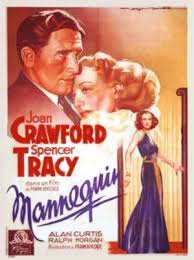
MANNEQUIN
US, 1937, 95 minutes, Black and white.
Joan Crawford, Spencer Tracy, Alan Curtis, Ralph Morgan, Mary Philips, Elizabeth Risdon, Leo Gorcey.
Directed by Frank Borzage.
Mannequin is a typical late 130s star vehicle for Joan Crawford and has the M.G.M. glossy production treatment. She has done similar parts many times, culminating in her Oscar winning Mildred Pierce. The year after this film she was to be effective in George Cukor's The Women. The film is of interest in having Spencer Tracy as her leading man, he acts well but is not particularly persuasive in working with Joan. Direction is by Frank Borzage, a director of many moving dramas in the '30s and '40s as well as a lot of slight entertainments.
1. The film as a Joan Crawford vehicle, '30s soap opera? Its impact in its time, now? Perennial popularity of soap opera? A Spencer Tracy vehicle?
2. M.G.M. production values, black and white photography. studio work, locations? Atmosphere of the New York world? Musical score?
3. The title and the focus, expectations? A symbol of Jessie?
4. Joan Crawford as Jessie, an American type, her background, her family, ambitions? Soft, strong? Bitter and loving? Hurt and self-sacrificing? The ingredients of the Joan Crawford image?
5. The character sketch of Jessie, at home and her family, parents and criticism, her brother? Her work and factories? Her seeming out of place at how and at work? Tenement life and her needs?
6. The relationship with Eddie, her pushing the wedding? Her enjoyment of the wedding, the reception? Beryl and her support? Her dancing with J. L. Hennessy? The encounter with Briggs? The ironies for each of them and for the future?
7. Jessie as romantic at this stage of her life? the dance, the singing? The apartment and her happiness? Work? Her disillusionment with Eddie and his being sorry? Her working as a dancer, the party, her disillusionment? Prison? Her losses with Eddie and her waking up to herself? The comparisons with J. L. Hennessy?
8. Her changing and working by herself, as a mannequin and her fashion style, her encounters with Hennessy? Going out with him, the proposition of marriage, her decision? Ireland and the honeymoon? Eddie and his turning up again in crisis? His push?
9. The sketch of Eddie, smart, opportunist, a pleasant manner? His being defeated, evicted? His plan to blackmail Hennessy and Jessie? The climax and his change of heart? How credible?
10. The portrait of Hennessy and the Spencer Tracy type? The background of Hester Street, his becoming a magnate? His conduct of meetings, the capability in business management, the unions? Briggs and his support? The encounter with Jessie, his fascination with her, the party, the elevator sequence? The prison sequence? The clash with Jessie and then marrying her? The happiness, the honeymoon?
11. The family, Beryl, Briggs?
12. The irony of the clashes, Hennessy and his willingness to let Jessie go, Jessie and her trying to save Eddie? Eddie and the truth?
13. The background of finance, the Depression. unions, Hennessey’s losing money?
14. The basic themes of best-sellers and soap operas? how interestingly presented for '30s entertainment, for picturing the American dream?
Published in Movie Reviews
Published in
Movie Reviews
Tagged under
Saturday, 18 September 2021 19:51
Barb Wire
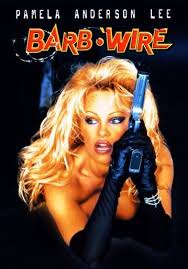
BARB WIRE
US, 1995, 95 minutes, Colour.
Pamela Anderson, Temuera Morrison, Steve Railsback, Xander Berkely, Victoria Rowell.
Directed by David Hogan.
There are many reasons for watching Barb Wire, but cinematic art and fine performances are not two of them. It is often a very corny film, exploitative of both sexuality and violence, exhibiting a sensibility that is sometimes brutal, relishing the rough. It is an example of 90s pop-art.
We know where we sit in the audience immediately – with the gyrating Pamela Anderson, in a leather suit which doesn’t quite fit, especially in the breast area, almost a parody of credits for Bond films and the Bond girls.
But a principal reason for watching the film is that it takes its plot from Casablanca, quite some significant parallels so that we know what might happen – and does. But it is Pamela who takes on the Humphrey Bogart role in the US, 2017, 20 years or more after the film was released, imagining a future America wary of dictatorship, a confederacy government is in charge, a police state. There is, however, a city on the coast which has some kind of freedom, where people might be able to escape to Canada, the city being Casablanca for this film.
Pamela Anderson plays Barb Wire (although her real name sounds particularly Polish) and she runs Hammerhead, a kind of hard rock, hard drinking, pole-dancing, strip joint. She runs it with the assistance of the bald Udo Keir whose name is Curley. He is her confidante and often wise advisor. Also at the Hammerhead is Barb’s brother, blinded in armed resistance attacks, posing as off-hand but still wanting to do something patriotic.
Ingrid Bergman’s role played by Temuera Morrison, fresh from his star appearance in Once Were Warriors. He is on the run with an expert who has defected from the confederacy government and they are looking for special lenses which will enable her to move freely in and out of the free world and the occupied world. Their story parallels that of Ingrid Bergman and Paul Henried, even at the end with Barb letting them go on the plane.
The Nazi atmosphere is created by having Steve Railsback as a very Teutonic commander, merciless, trying to track down the fugitives, visiting the Hammerhead, suspicious of Barb. He is the Conrad Veidt character. The local chief of police, the Claude Rains equivalent, is played by Xander Berkely, on the take, attracted to Barb, doing the right thing to let the fugitives go. He has a final phrase, not the literary equivalent of: this could be the beginning of a beautiful friendship but rather: I think I’m falling in love! The Sydney Greenstreet equivalent is a gross money dealer and traitor. And Clint Howard is the Peter Lorrie equivalent. So, quite some attention has been given to the structure of the plot, rather less to the dialogue itself.
The film is based on a Dark Horse comic book, made i in the mid-90s when this kind of film was not yet so popular and not so respectable. And, perhaps the performances to fit into this kind of comic strip background. Certainly the visuals, few holds barred in production design and special effects, are also comic-strip.
The film commands attention because of the presence of Pamela Anderson, a presence rather than a performer, objectified during the opening credits and right throughout the film – and memories of her presence in Baywatch. But, her character seems to be aware of the objectification takes umbrage at anybody calling her Baby. They don’t survive! She goes through all the required motions, acting as something of a double agent, very quick in martial arts and kicking, seemingly selling herself on the street while actually tracking down somebody as a bounty hunter. Having been disillusioned during the uprising in Seattle, with Temuera Morrison not coming back to her as she escaped, she has become embittered, not taking sides – except when her brother is brutally killed, when there is appeal to her better nature, a love of Temuera Morrison, her doing the right thing.
Fans of this kind of film will make allowances. In many ways, most ways perhaps, it is not very good at all. But it is striking to look at and, for film buffs, the parallels with Casablanca will offer some intriguing moments.
Published in Movie Reviews
Published in
Movie Reviews
Tagged under
Saturday, 18 September 2021 19:51
20 Ans D'Ecart/ It Boy

20 ANS D’ECARTS/ IT BOY
France, 2013, 92 minutes, Colour.
Virginie Efira, Pierre Niney, Charles Berling
Directed by David Moreau.
This is a slight French comedy, very Gallic in tone. As with so many of these romances, they sound good on the page, look good on the screen – but are not meant really to be reality. Although, the Americans do make similar kinds of films, like Down to You with Reese Witherspoon and Ewan Mc Gregor.
Virginie Efira plays Alice, a 40 something editor of the magazine, perfectionist, annoying practically everyone she deals with, but wanting to edit a new magazine Rebelle. She is warned that her particular perspective on magazines is out of date and that she will not necessarily get the job.
On a plane from Brazil she sat next to a young student, Balthazar, Pierre Niney, who steadies her during some particularly turbulent weather. When she loses her USB stick on the plane he contacts her – and, friendly with him, she decides to use him to change her image, hair, and wardrobe, her manner – and her being seen all around town with him. He is an engaging young student with a father with a roving eye, Charles Berling, and responds to Alice, falling in love with her, reacting when he discovers that she has been using him for her job. She has to go to persuade him to pose for the cover of the magazine, demanded by an owner from England. This leads to some farcical moments – but she has to take stock of herself, re-connects with Balthazar – and this is the end as well as the beginning of a cinema French fairytale.
1. A very Gallic romantic film? Audiences suspending disbelief, accepting the characters and the situation as real, but really a Gallic fairy tale?
2. The Paris settings, the magazine and its offices, homes and apartments, universities? Socials and parties? And the trip to Brazil? The musical score?
3. The title, indication of age differences? And the focus on Balthazar, his influence on Alice, her growing dependence on him, sexual relationship, falling in love?
4. The portrait of Alice, as editor, demanding, perfectionist, irritating the staff? Her visit to Brazil, the return, the toy at the airport, her fear on the plane, the passenger coming onto her, her reliance on Balthazar? Her losing her USB, Balthazar finding it, trying to give it back?
5. At home, her daughter, trying to control her, the daughter seeing through her mother? The visits from her former husband? Back to work, people talking behind her back?
6. The social engagements? The meetings at the office? The challenge to her perspective for the magazine? Her wanting it?
7. Balthazar getting in touch with her, her riding on the bike, people photographing her, on Facebook etc? Going to his house, his searching for the USB? With his father, his father as a womaniser, disappointed in not getting the phone call, moves towards Alice?
8. Alice and the tactic of inviting Balthazar, to the social, the kiss, more photographs, people laughing behind her back, the attitude of her boss? Plan for the magazine?
9. The change in her, her new clothes, the décolletage, make up, making her years younger? The reaction of her friends? At work? The daughter?
10. At home, the sexual encounter, effect on Balthazar, the effect on her? His being told that he was being used? The distance between them? Her realisation of what is happening, going to him, the bonds between the two?
11. Getting the editorship? The prissy English editor, looking at the cover, not liking the model, her remembering the fashion show, Balthazar and his gallantry with the falling model, her wanting him for the shoot? Going to him, difficult to persuade, the reaction of his father, taking him? Make up, the photographer and her being demanding, his reaction? The posing for the photo? In the water?
12. Alice, seeing the bus passing, Balthazar’s photo? Examining her own attitudes, making contact, discussions about age, comparisons between men and women and different ages, the facing the future together?
Published in Movie Reviews
Published in
Movie Reviews
Tagged under
Saturday, 18 September 2021 19:51
Scary Movie 3
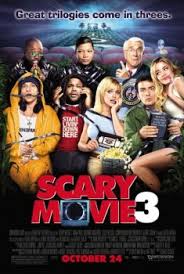 ow clever and how funny are the connections.
ow clever and how funny are the connections.Acting is not required in a film like this but Anna Farris who has been in all three is ideal sending up The Ring. Charlie Sheen does a take on Mel Gibson in Signs (with a guest spot from Sheen's wife, Denise Richards) and Queen Latifah turns up as The Oracle from we all know what.
Instantly forgettable, but a smile and some laughs while you are watching.
Published in Movie Reviews
Published in
Movie Reviews
Tagged under
Saturday, 18 September 2021 19:51
Angel. A
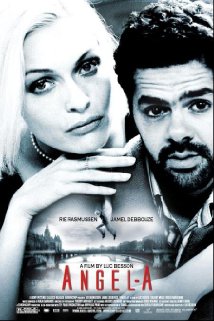
ANGEL. A
France, 2005, 91 minutes, Black and white.
Jamel Dabbouze, Ria Rasmussen, Gilbert Melki.
Directed by Luc Besson.
This is an unusual film. It is definitely an unusual film for writer-director Luc Besson. In the 1980s, he made a powerful impression with his first films blending action and surrealism, films like Le Dernier Combat and Subway. He had a passion for underwater filming with the feature, The Big Blue, and his fascinating documentary, Atlantis. Then he moved to more colourful and violent action with La Femme Nikita, Leon and The Fifth Element, capping the 1990s with his portrait of Joan of Arc, The Messenger.
Since then, he has changed gears, so to speak, with a passion for cars and trucks – and more mindless action: the Taxi series, the Transporter series and producing such ugly thrillers as Unleashed. His more recent script for District 13 was more tongue-in-cheek and more effective.
Who would have thought that after six years not directing a film, he would return with a touch of the Wim Wenders (incorporating the Besson world of criminals and violence)? Angel.A is Besson’s Wings of Desire. And filmed in black and white too.
In many ways, it is less complex than Wings of Desire (which, for those of us who did not warm to the Wenders, is not such a bad thing). Jamal Debbouze (one of the group of actors who won the Cannes Acting award for Indigenes) is a petty criminal out of his depth with no way of paying back debts. One way out is to throw himself into the Seine. As he contemplates this, he meets a tall, young, blonde woman – he is quite short – who does jump. He rescues her, only to discover that she is an angel sent to save him, Angela, Angel.A.
Who would have thought that Besson would also have a touch of the Frank Capras, echoing It’s a Wonderful Life?
There are quite a number of religious and philosophical conversations, especially about salvation and responsibility. Because Angel is tall and muscular, there are also some Besson-like physical encounters which show the Angel would be a good sidekick to Jet Li.
There are some who deride the frequent presence of angels in contemporary films (and there are quite a few) – unless they are in a Wenders’ film. A Besson angel is a quirky mixture of certainty and uncertainty, a commitment to a mission of salvation without knowing the outcome, a protector and a good friend. The angel question is whether having achieved her goal, she goes to heaven or comes down to earth.
This is an interesting and appealing odd-couple journey through both a down-to-earth Paris and a transcendent Paris.
1. The title? Angels in the 21st century? The film tradition of angels? Guardians? Coming down to earth? Sharing human experience, saving people and their lives? The influence of such films as It’s a Wonderful Life…?
2. Black and white photography, the city of Paris, the familiar landmarks, the beauty of the city, the ugliness of the city? The world of crime? The river, the cruise? The club? The musical score?
3. A film by Luc Besson? His usual emphasis on action, chasers and stunt work?
4. Andre, his story, as a person, at home in the world of petty crime, serving his prison sentence, getting out, the demands for repayment of debts? The death threats? Midnight?
5. Audience empathy with him or not?
6. His visits to the American Embassy, to no avail? The French police?
7. Despairing, going to the Bridge, seeing the tall girl? Their both jumping?
8. Andre and the moment his decision, to save the girl, his doing so?
9. On the banks of the river, his response to Angel? Her response to him?
10. Their going on the river, the cruise, the talk? Going to pay the creditors? Going to the club, the experience?
11. The revelation of who the Angel was, her mission, coming to save Andre, her personality, love and care for him? His response?
12. The film as something of a Parisien fairy tale – or an angel tale?
Published in Movie Reviews
Published in
Movie Reviews
Tagged under